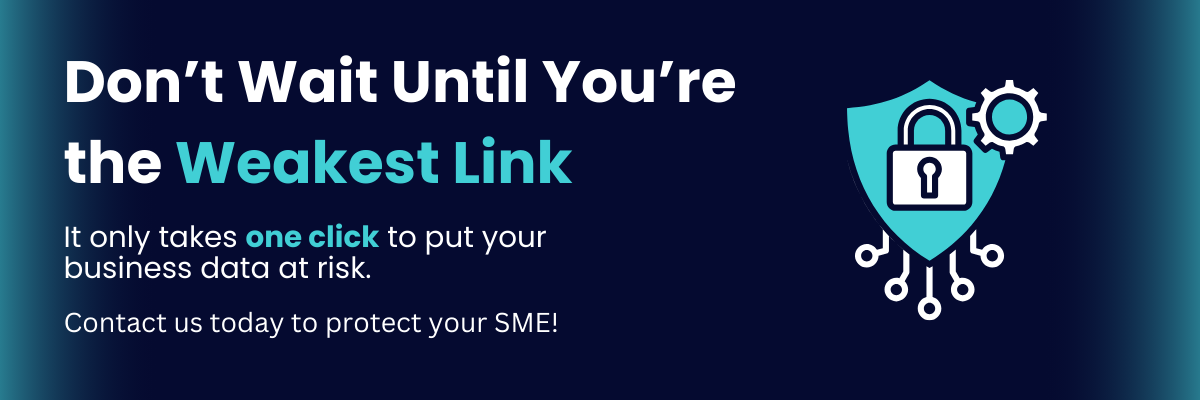You work hard to keep your business running smoothly, serving clients and maintaining trusted supplier relationships. But here’s the question: what if your business became a cybercriminal’s way into someone else’s network?
For many small and medium-sized enterprises (SMEs), cyber security feels like a “big business” problem. In reality, attackers often exploit smaller firms as stepping stones into larger targets – making SMEs accidental victims of supply chain attacks.
In this blog, we’ll explore SME cyber risks, how email and spoofing attacks make it easy for criminals to slip through the cracks, and how Cloud Geeni, powered by Huntress, helps protect both your business and your clients.
Why SMEs Are Caught in the Crossfire of Supply Chain Security
When we talk about supply chain security, most of us picture shipping, logistics, or supplier reliability. But digital connections are just as critical – and just as vulnerable. SMEs are often the unseen weak links that attackers exploit:
-
Attackers often start small: Instead of going straight for the “big prize” (a bank, hospital, or manufacturer), cybercriminals may breach a smaller partner with weaker defences and then move sideways.
-
Shared systems increase risk: Many SMEs share logins, cloud platforms, or file systems with clients or suppliers. If one side is compromised, the attacker may gain visibility into the other.
-
Trust is exploited: Employees are more likely to open attachments or click links if they appear to come from a known supplier or client.
-
Limited budgets make SMEs attractive: Large organisations may have dedicated IT teams, but SMEs often rely on smaller teams and tighter budgets. Attackers know that smaller businesses may not have advanced monitoring or strict cyber policies in place.
Recent research revealed that supply chain attacks accounted for 15% of small business breaches. This shows just how widespread – and preventable – these risks are.
For instance, imagine you’re a legal firm. One of your small suppliers unknowingly gets compromised. A cybercriminal then uses their email account to send you an invoice. It looks legitimate, with all the right branding.
All it takes is one misplaced click, malware is downloaded, and suddenly your clients’ confidential files are at risk. You weren’t the target – but you became the victim.
Email Security: The “Open Gate” Every Business Relies On
Email is vital for business – but also a key entry point for cyber-attacks. It’s the universal communication tool, used by every employee, every day. But it’s also the number one attack vector for phishing and supply chain exploitation.
Email is so risky for SMEs because:
-
It’s universal: Every team member has an email address – it only takes one mistake to create a breach.
-
Spoofing is easy: Attackers can convincingly imitate supplier domains, logos, and even writing styles.
-
Supply chain context works against you: If an email comes from a trusted supplier, it feels natural to click without second-guessing.
-
Volume creates distraction: Busy staff processing hundreds of emails daily are more likely to miss subtle red flags.
Sophisticated Spoofing: Why Attacks Look So Real
Cybercriminals have raised the stakes. Basic spam filters catch obvious scams, so attackers are turning to sophisticated spoofing techniques designed to trick even cautious employees. Examples include:
-
Domain impersonation: Registering fake domains that look nearly identical to trusted suppliers.
-
Display name spoofing: Emails appear “from” a familiar name, but the underlying address is malicious.
-
Business email compromise (BEC): Hijacking a real supplier’s account and sending instructions from their legitimate email address.
-
Redirected links: Embedding links that look safe but instead redirect to malicious websites at the last second.
-
Payment fraud: Sending altered invoices that appear to come from a supplier but funnel payments into the attacker’s account.
These tactics are powerful because they prey on trust. If your finance manager receives a payment request from what looks like your regular supplier, it’s easy to get caught out – unless you’ve built in both technical and human safeguards.
Why Huntress Makes the Difference
Huntress provides three key protection layers that work together:
-
EDR locks the doors: Protects laptops, desktops, and servers from malware and hidden backdoors.
-
ITDR protects the keys: Secures Microsoft 365 accounts from phishing, stolen credentials, and unauthorised access.
-
SIEM watches the whole building: Monitors your full network for suspicious activity, giving early warnings and compliance-ready reporting.
Each layer is backed by a human security team that investigates alerts, restricts access, and guides Cloud Geeni engineers through remediation steps.
How Cloud Geeni Helps SMEs Protect Against Supply Chain Risks
At Cloud Geeni, our managed IT services are designed to keep SMEs secure from evolving supply chain attacks. Powered by Huntress, we combine proactive monitoring with human-led analysis to deliver layered protection that fits your business needs.
We offer two tiers of cyber security protection, helping you choose the right level of coverage:
Essentials (EDR + ITDR)
This is ideal for SMEs that need strong, reliable protection without unnecessary complexity. The Essentials package includes:
-
24/7 threat monitoring to detect and contain cyber risks quickly.
-
Endpoint Detection and Response (EDR) for advanced protection across devices.
-
Microsoft 365 identity protection to safeguard user accounts and credentials.
-
Human-led threat remediation guided by expert analysts.
-
Compliance support to help your business stay aligned with key cyber standards.
-
Identity Threat Detection and Response (ITDR) to prevent unauthorised access and account misuse.
Comprehensive (Essentials + SIEM + Training)
For businesses requiring enterprise-grade defence, the Comprehensive package builds on Essentials with:
-
Security Awareness Training to empower your employees to spot phishing and spoofing attempts before they succeed.
-
Security Information & Event Management (SIEM), so you can gain full visibility of your network and receive alerts on suspicious activity.
-
All the benefits of the Essentials tier, ensuring complete, multi-layered protection.
This package is ideal for SMEs that handle sensitive data or have higher compliance requirements, offering the same level of protection trusted by larger enterprises.
Book Your Free Gap Analysis
SMEs are not immune to cyber threats. In fact, your connections to suppliers and clients make you an appealing gateway for attackers. Supply chain security, phishing, and email security all intersect here, and the cost of inaction is high.
By securing email, training staff, and protecting your cloud systems, you can not only reduce SME cyber risks but also strengthen your role in the wider supply chain.
Protect your business and your clients – book your free gap analysis today.



